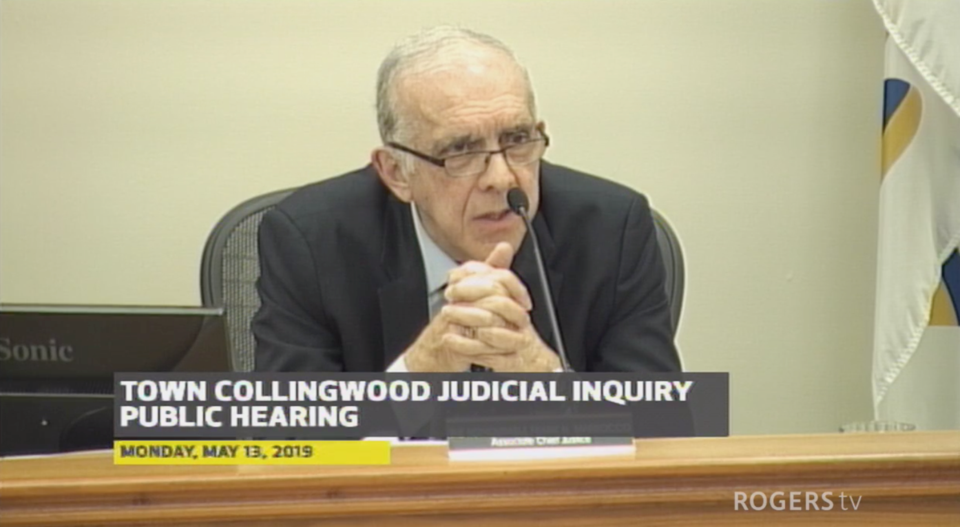The order of things at the judicial inquiry hearings will be a little different when it comes time for Edwin Houghton to testify.
Houghton, the former president and CEO of Collus, director of public works and engineering for the town, and later acting CAO of Collingwood, is due to testify next at the inquiry hearing.
Typically, each witness is examined first by the inquiry counsel (Kate McGrann or John Mather). However, Houghton has received permission from Associate Chief Justice Frank Marrocco, the commissioner of the hearing, to start his testimony with examination by his own lawyer, Fred Chenoweth.
According to Chenoweth, the switch in order is a “matter of personal preference.”
Inquiry counsel will still be able to cross-examine Houghton while he is on the witness stand, but Chenoweth will be the first to examine Houghton on the stand.
In Houghton’s application to have chief examination undertaken by Chenoweth instead of inquiry counsel, he included an affidavit with information supporting his request.
In his statement, Houghton said he is concerned about the potential of a notice of misconduct being issued to him by the commission.
“I would wish to have the benefit of full procedural fairness, including the right to have my evidence led by my own counsel,” said Houghton in his affidavit.
A notice of misconduct is a confidential memo issued to an individual over the course of an inquiry to let them know the commissioner - in the final report at the close of the inquiry - may comment adversely on the conduct of a person, corporation, institution or government in the final report.
The Ontario Public Inquiries Act states the commission cannot conclude there has been a misconduct by a person unless the inquiry provides reasonable notice of the possible finding and a summary of the evidence to support that possible finding.
The inquiry must therefore provide the allegations of misconduct to the person the allegations refer to, in order to allow that person to present evidence responding to the allegations.
The notice must also include reference to the evidence that led to the alleged misconduct.
Ronda Bessner, a senior legal analyst at five public inquiries - including the Walkerton Inquiry - co-authored a book titled Public Inquiries In Canada: Law and Practice.
In it, she writes commissioners of public inquiries are “prohibited from making findings of civil or criminal liability.”
Later, the book states a commissioner can make findings of fact, but in the interest of procedural fairness, those findings need to be fully-tested and those involved in the findings must have a chance to address the information and evidence that led the commissioner to a misconduct finding.
The notice of misconduct is confidential, so it is unknown whether the Collingwood Judicial Inquiry has or will issue a notice of misconduct to Houghton.
Findings of misconduct that remain - in the eyes of the commissioner - necessary will be included in the final report at the close of the Collingwood Judicial Inquiry. The final report will be public.
Today, John Glicksman, former chief financial officer of PowerStream is on the stand for cross-examination. At the conclusion of his testimony, Houghton will take the stand. There is no hearing on Wednesday and Thursday, but it will resume Friday, June 7 at 9 a.m.